Maui
Maui is the second largest Hawaiian island. It is an island formed by two volcanoes, hence its distinctive dumbbell shape. In the west is long extinct Mauna Kahalawai which over time has weathered into a series of mountains known as the West Maui Mountains reaching 1,764 metres (5,788 feet) in height at Puʻu Kukui summit. In the east is Haleakala volcano which is nearly twice as high as the West Maui Mountains at 3,055 metres (10,023 feet). The weathered landscape and lush vegetation of the west is reminiscent of Kauai while the young volcanic landscape of the eastern side has more in common with the Big Island. Maui has a population of just over 150,000, its main industries are tourism and agriculture the latter focused on growing coffee, macadamia nuts, pineapple, papaya and sugar.
Traditional Double Hulled Canoe, Lahaina
Lahaina is the largest town in West Maui and was the capital of the Kingdom of Hawaii between 1820 and 1845. It has many historic buildings and also a link to historic Hawaiian boats. Hui o Wa’a Kaulua is an organisation dedicated to keeping alive the craft of Hawaiian canoe building. In 1976 they launched Mo’olele (The Leaping Lizard), a wa’a kaulua (Hawaiian double hull canoe) with solid wood hulls, single mast and traditional crab claw sail. Refurbishment in 1995 has kept it sea worthy and it was moored off Lahaina when we visited.
Kahakuloa Bay & Head from Route 340
The Kahekili Highway (Route 340) twists and turns its way round the coast of the west of Maui from Kahului to Honokohau Bay.This road hugs the sea cliffs and is not for the faint hearted as it is very narrow (often just one lane), has many blind curves and has few guard rails. The reward for tackling this tricky road is some outstanding coastal scenery. In this picture 194 metre (636 foot) high Kahakuloa Head rises majestically from the Pacific Ocean. Legend says that Kahakuloa Head was a one of favourite cliff-diving location for King Kahekili, an 18th century Maui chief. Below this viewpoint nestles the remote village of Kahakuloa which was founded in 1887 and has a population of around 140. The Congregational Church in the village dates back to the foundation of the village. Click Tab 2 to see a picture of Kahakuloa Church in Old Kahakuloa Village. The picture of the church has been modified to remove an unsightly wire.
West Maui Mountains from Marriott Wailea Beach
Wailea is on the south western coast of the eastern part of Maui, overshadowed by the brooding mass of Haleakala. The coast at Wailea has sandy bays and rocky headlands, and ideal location for the many resort hotels gathered along the shore. The land between the eastern and western parts of Maui is low lying, so from Wailea the West Maui Mountains look as though they are on a separate island.
Pi'ilanihale Heiau, Kahanu Garden
In the north east of Maui, Kahanu Garden is a National Tropical Botanical Park that sits in one of the largest native hala forests in Hawaii. The garden features plant collections from Hawaii, Polynesia, Micronesia, and Melanesia and it aims to show the link between the plants and the culture of the people living in these places. In the garden is Pi‘ilanihale Heiau (House of Pi‘ilani), a huge rock platform of a sacrificial temple or residence built by a powerful chief. Pi'ilanihale Heiau was built in stages beginning in the 13th century and is the largest heiau in Polynesia. It is one of the best preserved in the Hawaiian Islands with a platform that measures 126 by 104 metres (415 by 341 feet) at the top.
DLU160628
Click on Minimap to navigate
Black Sand Beach, Wai'anapanapa State Park
If you expect beaches to be made of golden yellow sand, Maui can give you a surprise. Wai'anapanapa State Park in the east of te island has a beach named Pa'iloais where the sand is black. In the right conditions the contrast between a calm turquoise coloured sea and the black sand can be stunning but the day we visited the sea was a little too rough.
Baldwin Avenue, Makawao
Makawao is the biggest town in Upcountry Maui on the northern slopes of Haleakala volcano. In plantation days this area was famous for Hawaiian Cowboys, known as Paniolo, who wrangled cattle in this upland area. Those days are recreated every July 4th at the Makawao Rodeo. Along Baldwin Street there are many historic buildings from the plantation era. The town has become a centre for artists including painters glass blowers and wood sculptors.


Click the arrows above to continue on the Hawaii Trail. We have other pages on the Maui. To see them click below or on the Minimap:
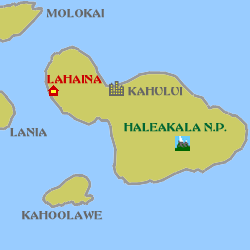
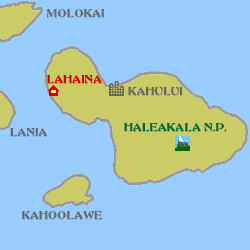
Click on Minimap to navigate
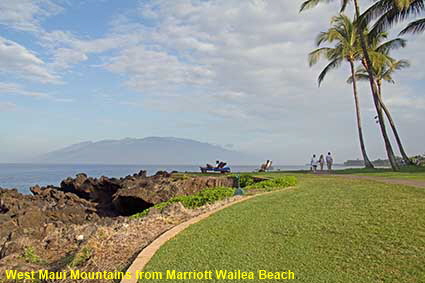
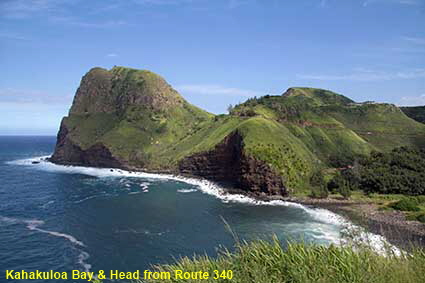

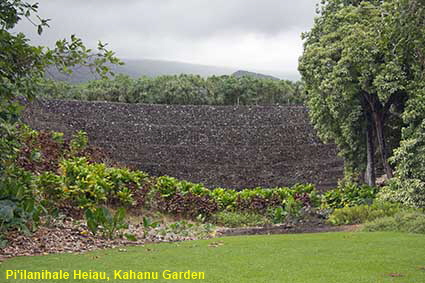
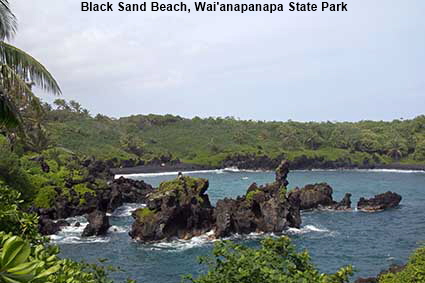
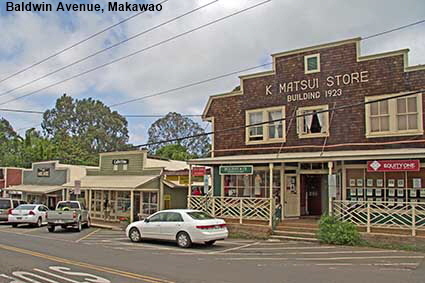
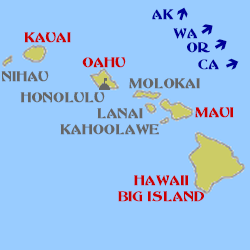
© Mike Elsden 1981 - 2025
The contents of this page may not be reproduced in full or in part without permission